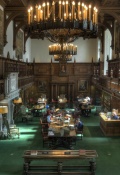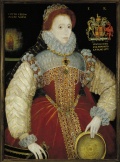Main Page: Difference between revisions
(Temporarily added Seiler residency as a feature.) |
(Removed Seiler Residency feature) |
||
| Line 17: | Line 17: | ||
<div class="col-md-8"> | <div class="col-md-8"> | ||
<div id="featured-pages"> | <div id="featured-pages"> | ||
{{Featured page | {{Featured page | ||
| page = Collection history and background | | page = Collection history and background | ||
| Line 31: | Line 24: | ||
| more = Read more... | | more = Read more... | ||
}} | }} | ||
{{Featured page | {{Featured page | ||
| page = The Plimpton "Sieve" portrait of Queen Elizabeth I | | page = The Plimpton "Sieve" portrait of Queen Elizabeth I | ||
| Line 39: | Line 31: | ||
| more = Find out more... | | more = Find out more... | ||
}} | }} | ||
</div> | </div> | ||
<div id="explore-folgerpedia"> | <div id="explore-folgerpedia"> | ||
Revision as of 07:46, 1 July 2016
What is Folgerpedia?
What is Folgerpedia?
Folgerpedia is the Folger Shakespeare Library's collaboratively-edited encyclopedia of all things "Folger." Articles address each topic as it relates to the Folger and the Folger collection. Folgerpedia began in 2014, and runs on the MediaWiki platform (the same software as Wikipedia). For more information and to learn how you can contribute, email folgerpedia@folger.edu.
Feature: The collection history and background of the Folger Shakespeare Library
Feature: The collection history and background of the Folger Shakespeare Library
The Folger's original collection centered on Shakespeare and English drama of his age. It consisted of rare books and manuscripts from the period as well as more recent writings, art, and ephemera related to Shakespeare and English drama. The latter category included prints, photographs, playbills, promptbooks, paintings, and reference books of many kinds.
Feature: The Plimpton "Sieve" portrait of Queen Elizabeth I
Feature: The Plimpton "Sieve" portrait of Queen Elizabeth I
Completed by George Gower in 1579, this work is part of a series of portraits of Elizabeth I in which she holds a sieve to symbolize her chastity. It is the earliest of the "sieve" portraits, and the oldest painting in the Folger Collection.
Recently updated
Help for editors
If you're new to creating articles, see the Folgerpedia article for what Folgerpedia is, Getting started for an introduction to creating content, and the Manual of Style for guidance on standard structure and formatting. Please read our Folgerpedia contributor policy before making any edits.
If you encounter any technical issues with the wiki, please email folgerpedia@folger.edu.


